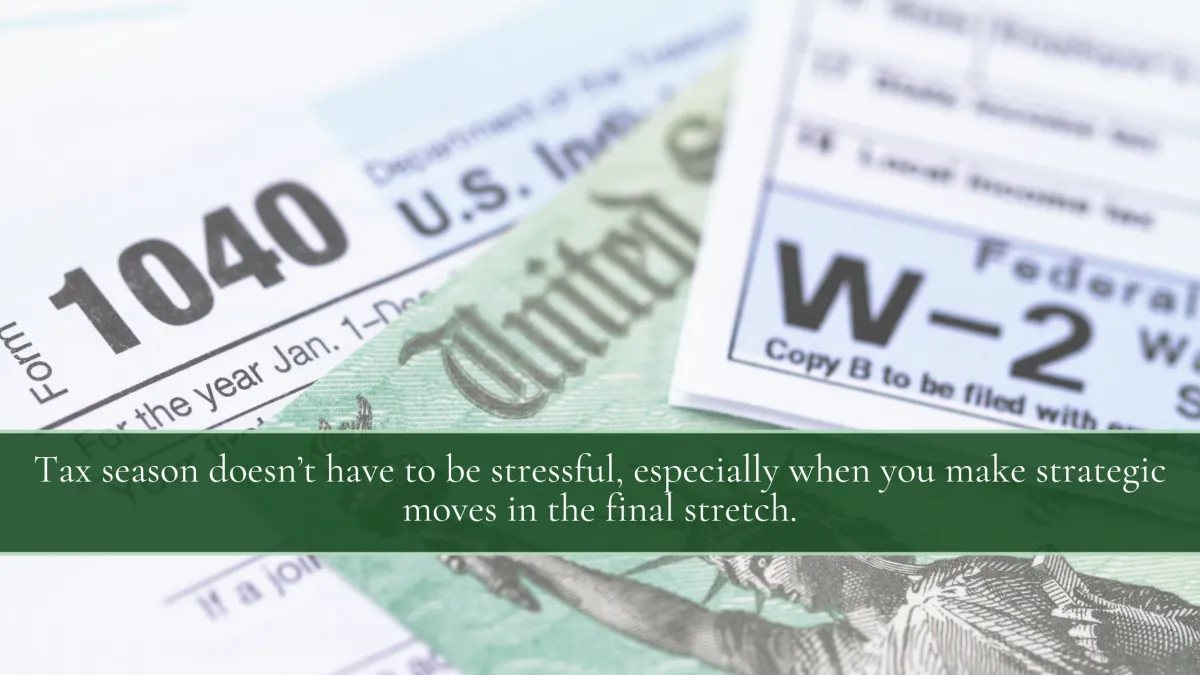
Level Up & Lock In: Last-Minute Money Moves Before Tax Season Ends
Tax season is upon us, and we’re all scrambling to get those last-minute moves in before the clock runs out. But don’t panic just yet—there’s still time to level up your finances and lock in some serious wins. Whether you’re looking to lower your tax bill or maximize your refund, a few strategic moves can make a big difference before the season closes.
Let’s take a deep breath, focus up, and make these final weeks count!

1. Contribute to Your Retirement Accounts
If you haven’t already, now is the perfect time to boost your retirement savings before the tax season ends. Whether it’s a 401(k), IRA, or Roth IRA, contributions to these accounts can reduce your taxable income for the year, potentially lowering your tax bill.
Here’s the rundown:
Traditional 401(k) or IRA: Contributions reduce your taxable income, so you’ll pay less in taxes now. The catch? You’ll pay taxes on this money when you withdraw it in retirement…. However, at that point, you can still have strategies in place to strategically plan distributions!
Roth IRA: Contributions don’t reduce your taxable income this year, but your withdrawals at retirement time are COMPLETELY tax-free!!! Imagine turning 100,000, into 1000,000 in over years/decades of contributions and not having to pay a penny on all this gain!
Even if you’ve already contributed throughout the year, you can still make additional contributions up until the tax filing deadline to maximize your savings and get that extra tax break.
Quick Tip: For 2025, you can contribute up to $23,500 to your 401(k) with a catch up of an additional $7,500 for employees 50 or older or $7,000 to an IRA (8,000 for those 50 years old or older).
2. Take Advantage of Flexible Spending Accounts (FSAs) and Health Savings Accounts (HSAs)
If you have a Flexible Spending Account (FSA) or Health Savings Account (HSA), now’s the time to use them! These accounts let you set aside pre-tax money for medical expenses, reducing your taxable income. If you’ve got funds sitting in these accounts, make sure to spend them before the deadline (usually March 15th for FSAs).

FSA: Check if you’ve maxed out your contribution for the year. If you haven’t, make sure to use the funds for medical expenses like doctor visits, prescriptions, or eligible over-the-counter products.
HSA: Not only can you use your HSA for healthcare costs, but it also acts as a retirement account. If you don’t need to use the funds now, you can leave them to grow tax-free until retirement. (Pro tip: Keep receipts for any medical expenses—you can always reimburse yourself later!)
Reminder: Unused FSA money might be forfeited if you don’t use it by the deadline. However, HSAs roll over year after year, so you’re not losing that money.
3. Max Out Charitable Contributions
If you’re feeling generous (or just looking for a tax break), donating to charity before the tax season ends is a great move. Charitable donations can be deducted from your taxable income, lowering your tax liability.
Here’s what you need to know:
Cash donations to qualified organizations are deductible.
Donating items (clothes, furniture, etc.) to a recognized charity also counts—just make sure to keep your receipts and note the fair market value of the items.
Pro Tip: You can even donate appreciated stocks or assets directly to charity and avoid paying capital gains taxes on them.
4. Harvest Tax Losses

If you’ve got investments that are underperforming, now’s the time to consider tax-loss harvesting. This strategy allows you to sell investments at a loss to offset taxable gains from other investments you’ve sold for a profit.
Why does this matter? The losses can reduce the amount of tax you owe on capital gains, and if you don’t have any gains, you can use up to $3,000 of losses to offset ordinary income.
Make sure to consult with a financial advisor before making any moves. They can help you decide which assets to sell and ensure it aligns with your long-term investment strategy.
5. Review Your W-4 and Adjust Withholdings
While it’s a little late to adjust for the current tax year, now is a great time to review your W-4 and withholding allowances for the year ahead. If you had a big tax bill last year (or a massive refund), it could be a sign that your withholdings need adjustment.
If you’re not having enough taken out of your paycheck, you might owe taxes come next April. If too much is withheld, you’re essentially giving the government an interest-free loan. Adjusting your W-4 ensures you’re on track to avoid any surprises come next tax season.
:max_bytes(150000):strip_icc()/GettyImages-1285914519-69d92ab9ed074a0db0192796cc62691c.jpg)
6. Don’t Forget About Credits & Deductions
Before you file your taxes, make sure you’re taking full advantage of any available tax credits and deductions. Credits reduce your tax bill dollar-for-dollar, while deductions reduce your taxable income.
Here are a few key ones to keep in mind:
Child Tax Credit: Worth up to $2,000 per qualifying child under 17.
Earned Income Tax Credit (EITC): For low to moderate-income earners, this can be a game-changer.
Education Credits: The American Opportunity Tax Credit (AOTC) and Lifetime Learning Credit (LLC) can help offset the costs of higher education.
Home Office Deduction: If you’ve worked from home, you may be eligible to deduct some of your home expenses.
Pro Tip: Take a few minutes to double-check your eligibility for these credits and deductions. It could save you more than you think.
7. Get Your Tax Filing Organized
We all know tax time can be chaotic, but the earlier you get organized, the less stressful it will be. Gather up all your documents—W-2s, 1099s, receipts, and anything else that might impact your return. The more organized you are now, the smoother the process will be.
Quick Checklist:
W-2 forms (for employees) or 1099s (for freelancers/contractors)
Receipts for deductible expenses
Records of any retirement account contributions
Statements from FSAs and HSAs
Once you’ve got everything in order, you’ll be ready to either file yourself or hand it over to your tax pro.
8. Consider Filing Early

Finally, if you haven’t already, it might be time to file your taxes early. Filing sooner rather than later means you’ll get your refund faster, plus you’ll have more time to make any adjustments if something comes up.
Plus, the earlier you file, the less likely you are to fall victim to identity theft. Filing early is an easy way to protect yourself from fraud.
Make the Most of Tax Season
Tax season doesn’t have to be stressful, especially when you make strategic moves in the final stretch. Whether it’s contributing to retirement accounts, leveraging tax-loss harvesting, or maximizing deductions and credits, there’s still plenty of time to make your financial situation work in your favor.
To take the next step in your journey, schedule a call with us for a free consultation!
